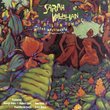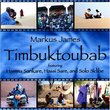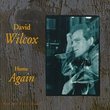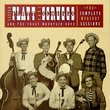| All Artists: Sheila Chandra Title: Indipop Retrospective Members Wishing: 1 Total Copies: 0 Label: Narada Original Release Date: 1/1/2003 Re-Release Date: 3/11/2003 Album Type: Enhanced Genres: International Music, Pop Styles: Far East & Asia, India & Pakistan, India Number of Discs: 1 SwapaCD Credits: 1 UPCs: 724358160406, 0724358160451 |
Search - Sheila Chandra :: Indipop Retrospective
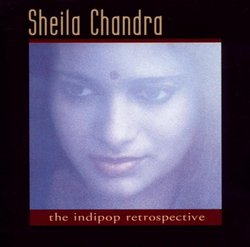 | Sheila Chandra Indipop Retrospective Genres: International Music, Pop
|
Larger Image |
CD DetailsSimilarly Requested CDs
|
CD ReviewsPure light 06/30/2003 (5 out of 5 stars) "It's been said that Sheila Chandra has one of the most beautiful voices in the world, and it's true. I also recommend her anthology Moonsung (which does not duplicate any of the tracks on this release)." A dozen of Sheila's best William M. Feagin | Upstate New York, USA | 10/08/2007 (5 out of 5 stars) "I first discovered Sheila Chandra through her trilogy of Realworld albums--Weaving My Ancestors' Voices, The Zen Kiss, and ABoneCroneDrone. Those albums feature Sheila's voice with only the most nominal accompaniment throughout; her singing is quite different from that of most Indian female singers that you'll hear if you watch a Bollywood film or listen to a soundtrack album or compilation of Bollywood film music. Most of those women have high-pitched voices and sound as if they're singing through a perpetual smile; in fact, you can see the happy, hopeful expressions during the dance numbers.
Sheila Chandra's voice is lower in pitch, more alto or even mezzo-soprano than the near falsetto voices you hear singing on the aformentioned Bollywood tunes. Her music has a much more serious tone to it--darker, more artful, more experimental even. And where the Realworld tracks feature nominal backing, here she works with more instrumentation, a mix of Eastern (notably sitar and tablas) and Western (guitars, bass, keyboards) that works better than you might think from my description. Of these 12 tracks, 6 were recorded in 1984-85 and appeared on her first 4 albums--"Prema, Shanti, Dharma, Satya" and "Village Girl" are from Out on My Own; "Quiet 3" and "Quiet 9" are from Quiet (which, like the later ABoneCroneDrone, worked from a unified concept and involved only wordless vocalisation); "Om Shanti Om" is from The Struggle; and "Nada Brahma (excerpt)" is a piece of the 27-minute title cut to (what else?) Nada Brahma, her last album for five years as she sought a new direction for her music. She found that new direction with Roots and Wings, which is represented here by the dazzling "Lament of McCrimmon/Song of the Banshee" (Chandra takes on Celtic airs in a move she would replicate on the first two Realworld albums--her version of "A Sailor's Life" that appears on The Zen Kiss is second only to Fairport Convention's version from their Unhalfbricking album, of which Chandra would later say the band had truly captured the feel of a raga), "One" and "Mecca," a mesmerising homage to the sacred journey undertaken by all Muslims at least once in their lifetimes. (And as a side comment, I'd like to add that the cover photo of Roots and Wings caused me to fall in love with Chandra--it's one of the most beautiful photos of her, as she bears the sober, high-born aspect of a raja's wife. Chandra is one of the best arguments for the beauty of South Asian women.) She left Indipop behind at that point for Realworld, returning in 2001 for This Sentence is True (The Previous Sentence is False), which is represented by two tracks, "This" and "Mien." A much darker album than the other Indipop recordings, it features a good deal more experimentation (note the backwards vocal tracks on "Mien," a bit of a nightmarish soundscape) than anything she'd done before, and it was recorded following her recovery from a throat ailment. It was also the last studio album to appear bearing her name, and--apart from a track recorded for the second "Lord of the Rings" film--the last recordings she's issued since. The world awaits your return to the studio, Sheila; may it not be delayed much further! In the meantime, sample this compilation of Chandra's best work, and let it lead you on to higher musical aspirations; Sheila Chandra's voice is music we should all aspire to enjoying." |

 Track Listings (12) - Disc #1
Track Listings (12) - Disc #1